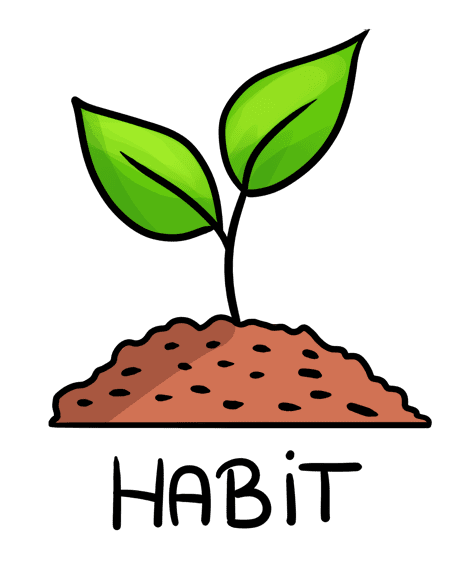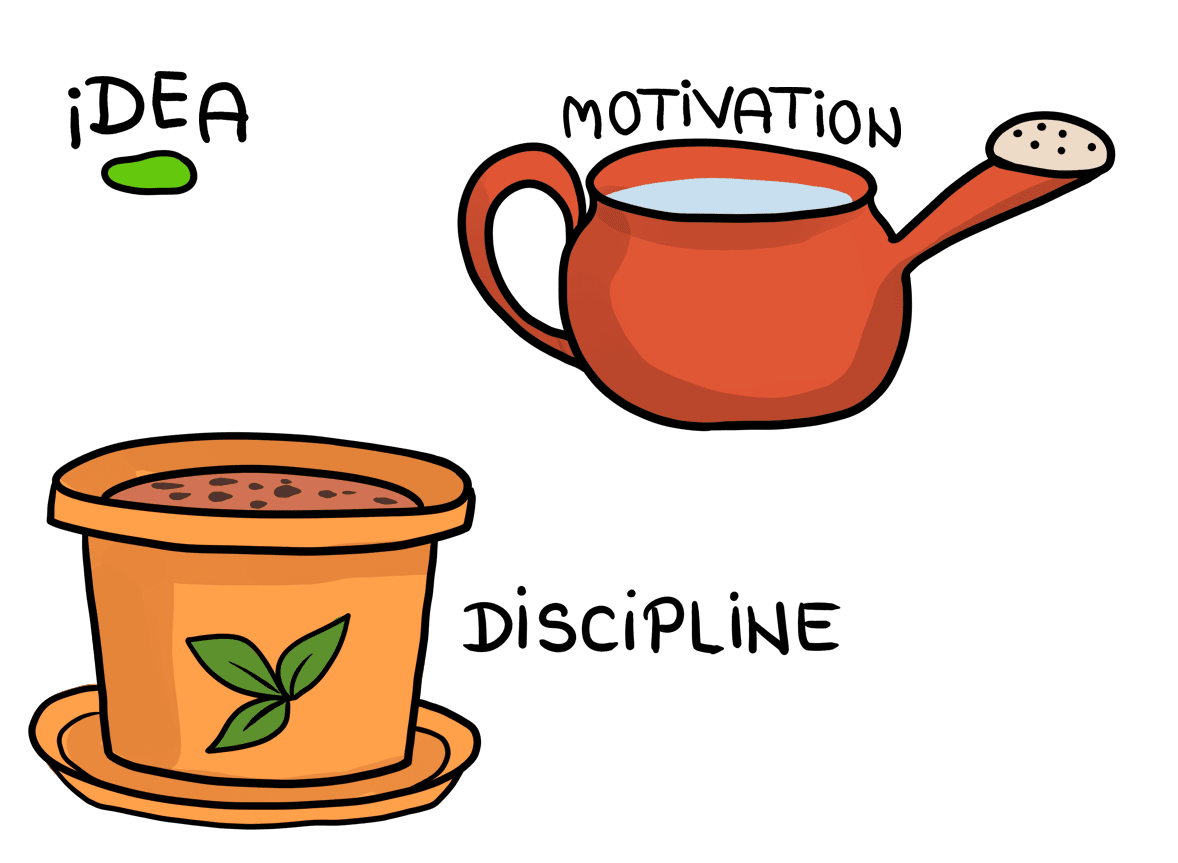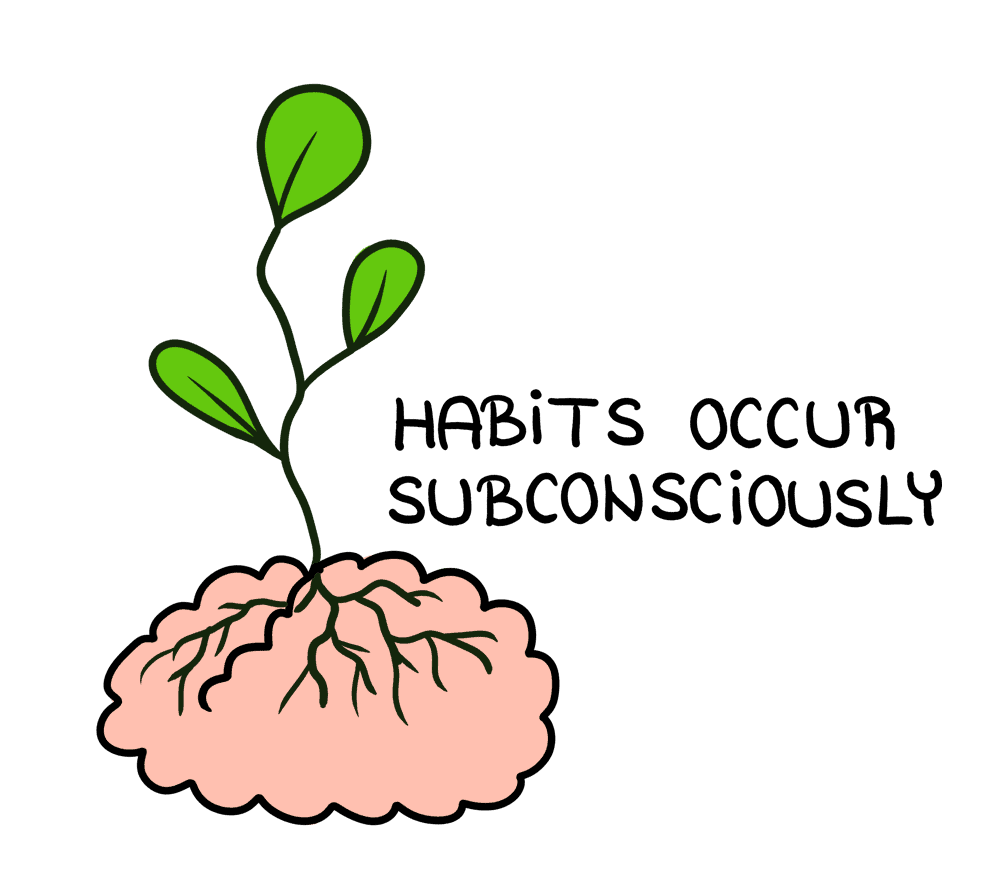Brushing our teeth twice a day, grocery shopping once a week, going out with friends every Tuesday... these are all habits that we may have developed over time. Habits can make our lives better or worse, depending on the types of habits we have. But what is a habit and why do we need habits in our lives?
What Are Habits?
Habits are routines and things that we do on a regular basis, some knowingly and some unknowingly. They keep you going when you want to get things done but you are low on motivation. It’s easier to do something if it’s a regular habit.

You won't need extra motivation if you have a habit because your mind just takes that particular action as a “default thing to do” at a particular time of the day. If a habit is there, you will continue doing that thing even it’s annoying or hard.
For example, you don’t really need extra motivation to brush your teeth, because if you've been doing it for 30 years, you just know that's what you do before you go to bed.
The great thing about habits is that you can train yourself to do them. You can train yourself to read a book or go for a six-mile bike ride when you wake up; you can even create habits for yourself that will help you to become more successful later on in your life!

Types of Habits (And Examples)
There are many ways to categorize habits: mental, physical, or emotional habits; motor, intellectual, and character-building habits, etc. Habits can be done in the morning, at night, once a week, twice a day, you name it! When u/MarbleWitch16 asked Reddit for bad habits, they got a long list of examples:
- Staying up late
- Skin-picking
- Cracking fingers and toes
- Brushing (or not brushing) teeth
The list goes on and on! Think about the things you do every morning. Maybe you make your bed, drink a cup of coffee, do 100 push-ups, or have a cigarette. All of these things are habits.
Why Are Habits Important?
Habits are especially important because we cannot rely on motivation, which will eventually go away.
Sure, we get motivated by reading a new book or by trying a new sport because it's fun; it’s interactive; it’s new and fresh! The novelty factor is always appealing to the brain and it helps us get started.
But what happens after a while?
When you cease to discover new things, you tend to get bored. As you advance further with your new interest - beyond the “beginner phase” - things will get harder, and you might not love your new activity as much as you did on the first day. The motivation slowly goes away... but by then, hopefully, you have developed a habit of doing it anyway.
When the motivation fades, discipline remains because you've built up a habit.
For example, if you say, “every day when I wake up I want to read for 30 minutes,” or “every day when I wake up I'm going to go for a six-mile bike ride,” it will be fun at first. As time goes on, you will struggle to do it, but over time your perseverance in doing that activity will compound and fuel your success.
The more successful, positive, and accelerating habits you have in your life, the more you will boost your success. Sadly, not very many people want to become disciplined, and there's a reason behind that.
Julius Irving said, “being a professional is doing the things you love to do, on the days you don’t feel like doing them.”
For example, anyone can go to YouTube and start learning how to play the piano or guitar. But when things get complicated or hard, they lose motivation and think, “oh, I have learned six chords and now I don't feel like learning anymore because I've learned the song that I wanted.”
What differentiates them from someone who is super successful is the fact that someone who is super successful has continued to learn more chords, even when they don't necessarily want to. They continued to progress and advance and challenge themselves.

How Are Habits Formed?
You need a lot of discipline to remove negative habits or to replace bad habits with good ones. Any positive change in your life will be difficult to make happen.
The good news is that changing or forming habits always get easier with time. Habits keep you going when the going gets tough and motivation drops - you just need the discipline to form that habit in the first place.
Another cool thing about habits is that once they are formed - once they are locked in the neural pathways of your brain - they will start to turn really difficult things that you once struggled with into easy tasks for you!
For example, you might struggle working out every day.
For example, Arnold Schwarzenegger worked out all the time when he was young, so now it’s easy for him! In fact, it would be out of character for him to lift less than once a week!
How much easier do you think it is for him to work out than it is for someone who has never worked out before? The more you do something, the better you get at it.
Once you have a habit formed, it will eventually compound. Take reading. If you read every day, you’ll start to read faster and more. By the time you're 60 or 70, just imagine how much knowledge you’ll have accumulated just by reading for 30 minutes every day!
We need to have habits in our lives. They are a gift of the human brain. They help us to keep improving ourselves and our lives, even after our motivation for something died down long ago.

Habits and Your Brain
Habits tend to occur subconsciously, which means we don't think about them consciously.
You don't think about that route you’ve taken every day for the last six years when you drive to work. Driving that route is automatic because you've built up a habit and your brain has established that neural pathway. As you drive, you know when to turn on your blinker and you automatically know where to go and what to do at every intersection.
Habits are well established when your brain stops spending resources on certain tasks. Established habits are simply a lower part of your thought process. You don’t have to think about them to do them.
If you can copy and paste other habits in that section of your brain - reading, working out, investing in your health and happiness - you can use that to boost your success. That's what the objective of habit harvesting is!
The Strength of Good Habits
One last thing about habits: they harden like concrete over time and they compound.
Let's say you have $3 every day and you put that into an investment account. For a while, it’ll feel tough losing that $3 that you could’ve spent on a cup of coffee or a candy bar. However, after a while, you’ll stop thinking about it and forget that you ever used to have an extra $3 every day.
It may become a habit that you won't even think about, but the results of it will definitely be shown. If you start at age 20 and you end at age 60, investing $3 every day will make you over $700,000!
An example of a negative habit is alcohol. If you drink alcohol every day from the time you are 20 to the time you are 60, there will be some unimaginable effects on your health, wealth, love, and happiness aspects of your life.
Quotes About Habits
Wise, successful people have a lot to say about habits. If you need motivation while forming a habit, write these quotes down on a sticky note!
Quotes About the Importance of Habits
"You’ll never change your life until you change something you do daily. The secret to your success is found in your daily routine." -John C. Maxwell
"We are what we repeatedly do. Excellence, therefore, is not an act but a habit." -Aristotle
"Persistence is the direct result of habit. The mind absorbs and becomes a part of the daily experiences upon which it feeds. Fear, the worst of all enemies, can be effectively cured by forced repetition of acts of courage." -Napoleon Hill
"Sow a thought, reap an action; sow an action, reap a habit; sow a habit, reap a character; sow a character, reap a destiny." -Stephen Covey
Quotes on the Importance of Forming Good Habits
“I think goals should never be easy, they should force you to work, even if they are uncomfortable at the time.” - Michael Phelps
"Successful people are simply those with successful habits." -Brian Tracy
"First we form habits, then they form us. Conquer your bad habits, or they’ll eventually conquer you." -Unknown
Books About Habits
Interested in reading more about habits? The following books are great resources:
- Tiny Habits: The Small Changes That Change Everything by BJ Fogg
- Atomic Habits: An Easy & Proven Way to Build Good Habits & Break Bad Ones by James Clear
- The Power of Habit: Why We Do What We Do In Life and Business by Charles Duhigg
- You Are What You Choose: The Habits of Mind That Really Determine How We Make Decisions by Scott de Marchi and James T. Hamilton
-
Rewire: Change Your Brain to Break Bad Habits, Overcome Addictions, Conquer Self-Destructive Behavior by Richard O'Connor
The Psychology of Habits
Habits can be positive, but they can also be negative. You could smoke three cigarettes a day, or you could smoke half a pack a day - both habits will compound and lead to the unsuccessful part of your life. You know you'll have higher chances of lung cancer, and your friends and family may not hang around you as often if you have a smoking habit.
I have written multiple pages on the importance of habits. They contain everything you need to know about:
- Habits of great relationships
- Habits of happy, healthy, wealthy, and successful people
- How to create a habit
- How to get rid of a bad habit
- Replacing bad habits with good habits
- Habits for saving money and learning material quicker
I aim to help you identify all the habits in your life and reverse engineer them and say, “Is this going to help me to get to where I want to go?” So keep reading to learn how habits can help you to improve your life!
